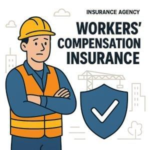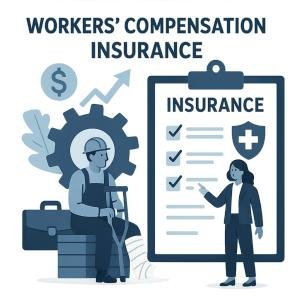
Skilled Nursing Facility Workers’ Comp Rate Calculator: Estimate Your Costs
September 11, 2025
Audit Prep—ASO Workers’ Comp
September 12, 2025Navigating the complexities of workers’ compensation insurance is a critical concern for businesses operating in Georgia. for many companies, partnering with a Professional Employer Association (PEO) offers a streamlined and cost-effective solution to managing this essential coverage. This article provides a step-by-step guide to buying workers’ comp in Georgia through a PEO, outlining the key considerations and procedural milestones that employers need to understand. By leveraging the expertise and resources of a PEO, Georgia businesses can ensure compliance, reduce administrative burdens, and safeguard their workforce with confidence.
Table of Contents
- Understanding Workers’ Compensation Requirements for PEOs in Georgia
- Evaluating and Selecting the right PEO for Comprehensive Workers’ Comp Coverage
- Navigating the Enrollment Process with a PEO for Effective Workers’ Compensation Protection
- Best Practices for Managing Workers’ Compensation Claims Through a PEO Partnership
- Q&A
- Concluding Remarks
Understanding Workers’ Compensation Requirements for PEOs in Georgia
When partnering with a Professional Employer Organization (PEO) in Georgia, it’s essential to comprehend how workers’ compensation coverage is managed to ensure compliance and adequate protection for your workforce. In most cases, PEOs act as the employer of record, meaning the responsibility for securing and maintaining workers’ comp insurance usually falls under their umbrella. However, Georgia’s regulations require both parties to understand their roles clearly, especially since the PEO’s policy covers the employees while the client company remains liable for workplace safety and risk management.
Key factors to consider include:
- Verification of coverage: Confirm that the PEO holds valid and adequate workers’ compensation insurance that complies with Georgia’s statutory limits.
- Joint liability considerations: Understand that despite the PEO carrying the policy, your company may still face liabilities for workplace incidents if negligence is proven.
- Certificate of Insurance (COI): Always request a COI to document coverage details and ensure that it remains active throughout the contractual relationship.
| Requirement | PEO Responsibility | Client Company Role |
|---|---|---|
| Insurance Procurement | Obtains and maintains workers’ comp policy | Review and confirm policy validity |
| Claims Management | Handles claims processing and reporting | Assist with accurate incident reporting |
| Compliance | Ensures adherence to state regulations | Maintain safe workplace practices |
Evaluating and Selecting the Right PEO for Comprehensive workers’ Comp Coverage
When choosing a Professional Employer Organization (PEO) for workers’ compensation coverage in Georgia, it is crucial to assess their financial stability, industry reputation, and compliance expertise. A reputable PEO will have a proven track record of managing workers’ comp claims efficiently while minimizing your business liabilities. look for PEOs that offer tailored solutions to fit your specific industry needs, as risks and regulatory requirements can vary substantially between sectors. Additionally, verify their partnerships with licensed insurance carriers to ensure you receive comprehensive coverage and prompt claims handling.
Key factors to consider include:
- Experience with Georgia-specific workers’ compensation regulations
- Obvious fee structures and cost-saving strategies
- Dedicated risk management and safety programs
- Robust claims support and reporting capabilities
| Evaluation Criteria | What to Look for | why It Matters |
|---|---|---|
| Financial strength | Strong capital reserves and A.M. Best ratings | Ensures reliable claims payment and long-term stability |
| Client Testimonials | Positive reviews from businesses in your industry | Indicates satisfaction with service quality and claims handling |
| Compliance expertise | Knowledge of Georgia labor laws and OSHA regulations | Minimizes risk of penalties and coverage gaps |
Navigating the Enrollment Process with a PEO for Effective Workers’ Compensation Protection
Partnering with a Professional Employer Organization (PEO) simplifies the complexities associated with securing workers’ compensation coverage in Georgia. To begin, businesses should provide the PEO with detailed employee classifications, payroll data, and operational specifics. This details allows the PEO to assess risk accurately and tailor coverage solutions that align with your workforce profile. The PEO will handle all necessary paperwork and compliance requirements, ensuring your company meets state mandates while optimizing premium rates.
During the enrollment process, proactive communication is crucial. Businesses should focus on:
- gathering accurate employee data including job duties and tenure
- reviewing insurance packages offered by the PEO to select appropriate coverage levels
- Verifying compliance timelines and documentation submission deadlines
- Understanding claims management protocols provided by the PEO
Below is a simplified timeline to illustrate the key stages when enrolling with a PEO for workers’ compensation:
| Step | Action | Expected Timeframe |
|---|---|---|
| 1 | Submit Employee and Payroll data | 1-3 Business Days |
| 2 | Review & Select Insurance options | 3-5 Business Days |
| 3 | Sign Agreements & Confirm Enrollment | 2 Business Days |
| 4 | Policy Activation & Compliance Confirmation | Immediate to 1 Week |
Best Practices for Managing Workers’ Compensation Claims Through a PEO partnership
Effective management of workers’ compensation claims through a PEO partnership starts with clear communication and defined roles. Establishing a collaborative relationship ensures that the PEO handles claims promptly while keeping you informed of developments and compliance requirements. Utilize the PEO’s expertise to streamline reporting, documentation, and investigation processes, wich helps minimize claim disputes and supports quicker resolution. Remember, clarity enables both parties to monitor claim trends and implement preventive workplace safety programs tailored to your industry.
To maximize the benefits of a PEO arrangement, integrate your internal teams and the PEO’s claims specialists in ongoing training and risk management discussions. Focus on these best practices:
- Regularly review claim data and loss runs with your PEO to identify patterns.
- ensure prompt reporting of incidents directly to the PEO for timely action.
- Leverage technology provided by the PEO for tracking and managing claims efficiently.
- Engage employees in safety awareness initiatives driven by shared insights.
By committing to these efforts, your organization benefits from reduced claim costs, improved compliance, and a stronger, safer workforce.
Q&A
Q&A: Buying Workers’ Comp in Georgia Through a PEO - Step-by-Step Guide
Q1: What is a Professional Employer Organization (PEO), and how does it relate to workers’ compensation in Georgia?
A1: A PEO is a firm that provides comprehensive HR services, including payroll, benefits, and workers’ compensation management, by co-employing a company’s workforce. In Georgia, engaging a PEO allows businesses to access pooled workers’ compensation insurance, often resulting in better coverage terms and competitive rates.
Q2: Why should Georgia businesses consider buying workers’ comp through a PEO?
A2: PEOs leverage their collective bargaining power to secure lower premiums and broader coverage options.They also streamline claims management and regulatory compliance, reducing administrative burdens for Georgia employers and improving workplace safety protocols.
Q3: What are the initial steps for a business in Georgia to purchase workers’ comp via a PEO?
A3: First, research and identify reputable PEOs operating in Georgia, ensuring they are licensed by the georgia Department of Insurance. Next, evaluate service offerings, pricing structures, and client reviews.Upon selection,businesses typically enter into a co-employment agreement outlining responsibilities,including workers’ compensation coverage.
Q4: How does the PEO handle workers’ compensation insurance procurement in Georgia?
A4: The PEO pools employees from multiple client companies to negotiate workers’ compensation insurance policies with carriers. They manage policy acquisition, premium payments, and claims processing on behalf of their clients, transferring much of the administrative workload from the employer.
Q5: What documentation is required from a Georgia business when buying workers’ comp through a PEO?
A5: The business needs to provide employee census data (job classifications, payroll), company financials, and safety records. The PEO uses this information to accurately assess risk and determine the appropriate workers’ compensation coverage and premium rates.
Q6: How does the transition to a PEO-managed workers’ compensation policy impact Georgia employers?
A6: Employers benefit from reduced liability exposure, improved risk management, and enhanced compliance with Georgia workers’ comp laws. However, it is critical to understand the terms of the co-employment agreement to clarify responsibilities regarding claims and employee management.
Q7: Are there any regulatory considerations Georgia businesses should be aware of when buying workers’ comp through a PEO?
A7: Yes, the PEO must be registered with the Georgia Secretary of State and comply with state insurance regulations. Businesses should verify that the PEO’s workers’ compensation carriers are authorized in Georgia and that all coverage meets state-mandated minimums.
Q8: What are the ongoing responsibilities of the employer once workers’ comp coverage is purchased through a PEO in Georgia?
A8: Employers should maintain open communication with the PEO regarding workplace injuries, cooperate during claims investigations, and adhere to workplace safety standards. They should also review periodic reports from the PEO to monitor claims and compliance status.
Q9: Can small businesses in Georgia benefit from using a PEO for workers’ compensation coverage?
A9: Absolutely. Small businesses often face high workers’ comp premiums due to limited pool size. Partnering with a PEO helps mitigate this by aggregating risk across multiple clients, reducing costs and providing access to professional risk management resources.
Q10: How can a Georgia employer evaluate the effectiveness of their PEO workers’ comp program?
A10: Employers should assess claim frequency and severity trends,premium cost savings,responsiveness of claims handling,and overall employee satisfaction with safety initiatives. Regular reviews ensure that the PEO continues to deliver value and compliance with Georgia’s regulations.
Concluding Remarks
navigating the complexities of purchasing workers’ compensation insurance in Georgia through a Professional Employer Organization requires careful consideration and adherence to state-specific requirements. By following the step-by-step approach outlined above, businesses can effectively leverage a PEO’s expertise to secure compliant and cost-efficient coverage, ultimately safeguarding both their workforce and their operations. Partnering with a reputable PEO not onyl streamlines the insurance process but also provides ongoing support, allowing companies to focus on growth and productivity with peace of mind.
“This content was generated with the assistance of artificial intelligence. While we strive for accuracy, AI-generated content may not always reflect the most current information or professional advice. Users are encouraged to independently verify critical information and, where appropriate, consult with qualified professionals, lawyers, state statutes and regulations & NCCI rules & manuals before making decisions based on this content.







